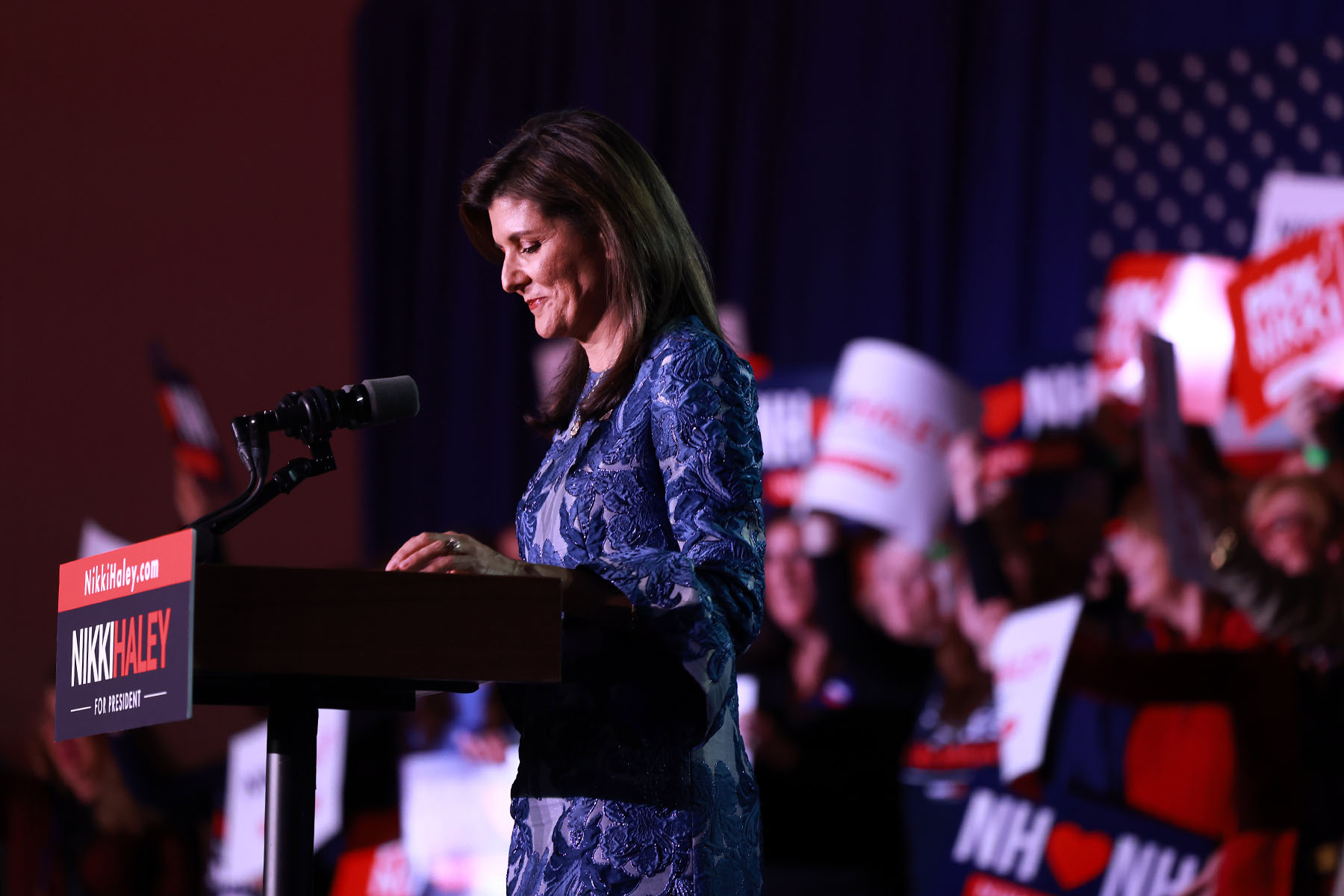Nikki Haley’s projected victory in Vermont’s presidential primary Tuesday makes her the first Republican woman seeking the presidency to win two nominating contests, even as her prospects for defeating front-runner Donald Trump continue to appear unlikely.
Haley’s wins in Washington, D.C., and in Vermont amounted to a small victory for a campaign that has struggled to even come close to defeating Trump in every other state where the two have competed, including the other states on the Super Tuesday roster and Haley’s own home state of South Carolina. Her primary wins, while no match for Trump’s victories elsewhere, further entrenched her as the Republican woman who’s come closest to the presidency.
Haley’s own campaign, which has largely stayed away from — and sometimes eschewed —the historic nature of her run, sent a brief news release to reporters marking the win in D.C. on Sunday. “Nikki Haley is the first woman to win a Republican primary in United States’ history,” the campaign said.
The former South Carolina governor and U.S. ambassador to the United Nations had promised to carry on with her challenge to the former president through this week’s Super Tuesday contests, but it’s still unclear if Haley intends to go any further.
“Everyone in the media is trying to figure out, why does she keep fighting? I think they’ve finally accepted that I’m not trying to be vice president. This is not about a future political career. … The reason I’m doing this is for my kids and your kids and grandkids,” Haley said last week during a campaign rally in Richmond, Va., one of the states holding a primary on Super Tuesday.
“In a general election, we’re given a choice, in a primary we make our choice.”
Neither Haley nor Trump immediately reacted to her win in Vermont. Trump’s campaign mocked Haley’s win in Washington by saying she had been “crowned Queen of the Swamp.” Haley’s campaign said that “Republicans closest to Washington dysfunction are rejecting Donald Trump and all his chaos.”
By appearing in the slate of Super Tuesday ballots, Haley became the first Republican woman in the modern GOP to appear on 26 nominating contest ballots; the previous record was two.
Haley has also secured a record number of convention delegates for a Republican woman seeking the presidency with 69, compared with the previous record of one. That record could grow further, but she is not likely to come close to Trump’s nearly 200 pledged delegates. Republican candidates need 1,215 pledged delegates earned through the primary process to formally win the nomination during the party’s convention this summer..
As she carried on with an improbable campaign into Super Tuesday, Haley’s message to voters continues to hang on her electability: that she’s the last candidate who can take down Trump and the only Republican who can defeat Biden. In a country where voters’ perceptions of who is electable have long hindered women candidates, Haley’s unlikely trajectory from lone woman in the race, polling in the single digits, to final holdout against Trump has already upended expectations for women presidential candidates in the modern GOP.
When it comes to the history of presidential runs, Republican women have been left in the dust. Haley’s campaign for president has marked a leap for women in the party, and her steady ascent in the GOP primary so far as a Republican alternative to Donald Trump continues to hold historic potential.
Coming into the 2024 election cycle, no Republican woman had yet won a presidential primary or caucus, a milestone Hillary Clinton clinched for Democrats when she won the New Hampshire primary in 2008. Clinton, of course, in 2016 went on to become the first woman to win a major party’s nomination for president, a historic feat that polling suggests remains far from Haley’s reach.
Haley was an early entrant in the 2024 GOP primary field, promising to challenge the status quo and bring the unique strengths of women leaders to the White House. At the same time, she has eschewed liberal gender politics, downplaying the role of her race and gender on her political views before a GOP primary electorate.

At her launch in February of last year, Haley became one of a handful of high-profile women to have sought the Republican presidential nomination and the first Asian-American woman to ever do so. Last August, she became the 12th woman ever to participate in a presidential debate in the nation’s 200-plus year history of presidential politics, and only the third Republican woman to ever do so.
For Republican women in politics who are advocating for increased representation in a party that rails against attention to diversity and equity, Haley’s run represents a step forward for both recruitment and visibility. Though recent attacks against Haley and calls for her to end her bid against Trump stand to hurt recruitment efforts, say some women who are backing Haley and working on growing the ranks of women in the party.
Rina Shah, a political strategist and commentator who has advised Republican campaigns, said the significance of Haley’s run lies in her ascent from support in the single digits to prominent endorsements from major conservative groups and donors based on her performance.
“When you talk about how the world turns these days, it’s about the money and the power, and to have the powerful and moneyed come to say, ‘She’s the one,’ based on her performances — that’s what she’s fighting for. That’s what I’m fighting for,” Shah said in an interview. “I feel like that’s what the vast majority of American women want. We want to be seen.”
Haley’s delegates will represent her at the party’s national convention this summer, even if by then, the primary is all but over. The candidate with a majority of delegates will win the nomination.
It’s worth noting that in 2016, GOP presidential candidate Carly Fiorina was awarded a single delegate in Iowa, and before that, in 2012, Michele Bachmann won a delegate in Texas, according to the Center for Women and Politics. In 1964, former Sen. Margaret Chase Smith won delegate votes at the party’s conventions, but the rules at that time were significantly different than they are today.
Kelly Dittmar, the director of research at CAWP, noted that Haley stands to make history for Republican women the longer she stays in the race. Fiorina appeared in only two nominating contest ballots, as did Bachmann in 2012.
That could have important implications for the Republican Party, where the electorate has had less exposure to the potential for a woman to be a strong contender for the presidency.
As for Haley, the potential for history making is something she teases at, not outright embraces.
“I think she doesn’t find many audiences where it’s something that is going to help her,” Dittmar said. “It is not something she leans into very much.”






